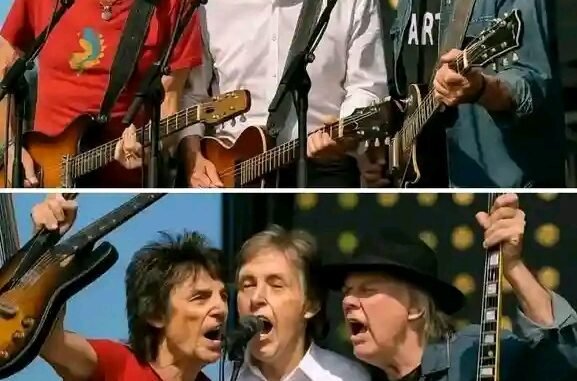
A Night Written in Rock ‘n’ Roll Fire
Ronnie Wood had seen it all—or so he thought. A veteran of countless tours, legendary sessions, and backstage moments that defined generations, nothing truly surprised him anymore. But as he stood under the soft lights of the private Soho club, watching friends, fellow musicians, and admirers gather for the pre-tour celebration Paul McCartney had thrown in his honor, a strange sense of anticipation buzzed in his gut. The room brimmed with energy—old tales shared over glasses of scotch, laughter echoing off mahogany walls, and the subtle hum of a band warming up in the background. It was already shaping up to be a memorable evening. Still, no one could have predicted what would happen next.
The conversation around the room momentarily paused as the door creaked open. Heads turned. And then, as if stepping out of a dream—or a vinyl sleeve from 1972—Neil Young strode in, guitar slung over his shoulder, wearing a crooked grin that screamed mischief. The room froze, a beat of silence hanging in the air like a held breath. Then came the gasps, followed by applause and a flurry of wide-eyed glances. Wood’s jaw dropped slightly before curling into a knowing smile. He moved forward, arms wide, and embraced Young like a long-lost brother. “Didn’t see that one coming,” he whispered, half to himself. “Neither did I,” Neil replied, chuckling. It was clear now: this night was about to become something far more than a party.
What started as casual jamming quickly turned into something else entirely. McCartney sauntered toward the small stage, hoisting his iconic Höfner bass with ease. Wood grabbed his guitar—instinctively, without a word—and followed. Young needed no invitation. He plugged in, gave the amp a defiant nod, and struck a raw, bent chord that echoed like a thunderclap across the room. Within moments, the three of them locked into a rhythm—untamed, unfiltered, and breathtaking. There was no setlist, no plan, just decades of musical instinct guiding them. Beatles riffs morphed into Stones grooves, then gave way to the haunting melancholia of “Cortez the Killer.” It was messy. It was glorious. It was magic.
The crowd, once mingling and sipping drinks, now pressed toward the stage, eyes wide and hearts thumping. Phones stayed in pockets. No one wanted to break the spell. This wasn’t for social media—it was for the soul. Ronnie watched McCartney’s fingers fly over the fretboard, saw Neil throw back his head mid-verse, eyes closed, lost in the ether. And Ronnie? He was flying. His solos soared with the recklessness of youth and the weight of experience. It wasn’t rehearsed, and it wasn’t clean, but it was the kind of moment you can’t buy, fake, or ever truly recreate. It wasn’t just a jam session—it was a communion.
As the final chord rang out, feedback humming like a distant ghost, the three legends exchanged glances—equal parts disbelief and satisfaction. The room erupted, but even amid the cheers, Ronnie stood still, soaking it all in. This wasn’t just another gig, another night on the circuit. It was something sacred. A moment where time bent, where legends played not for glory, but for each other. For Ronnie Wood, it was more than a memory—it was a living chapter of rock history etched in sweat, sound,
and soul.
Leave a Reply